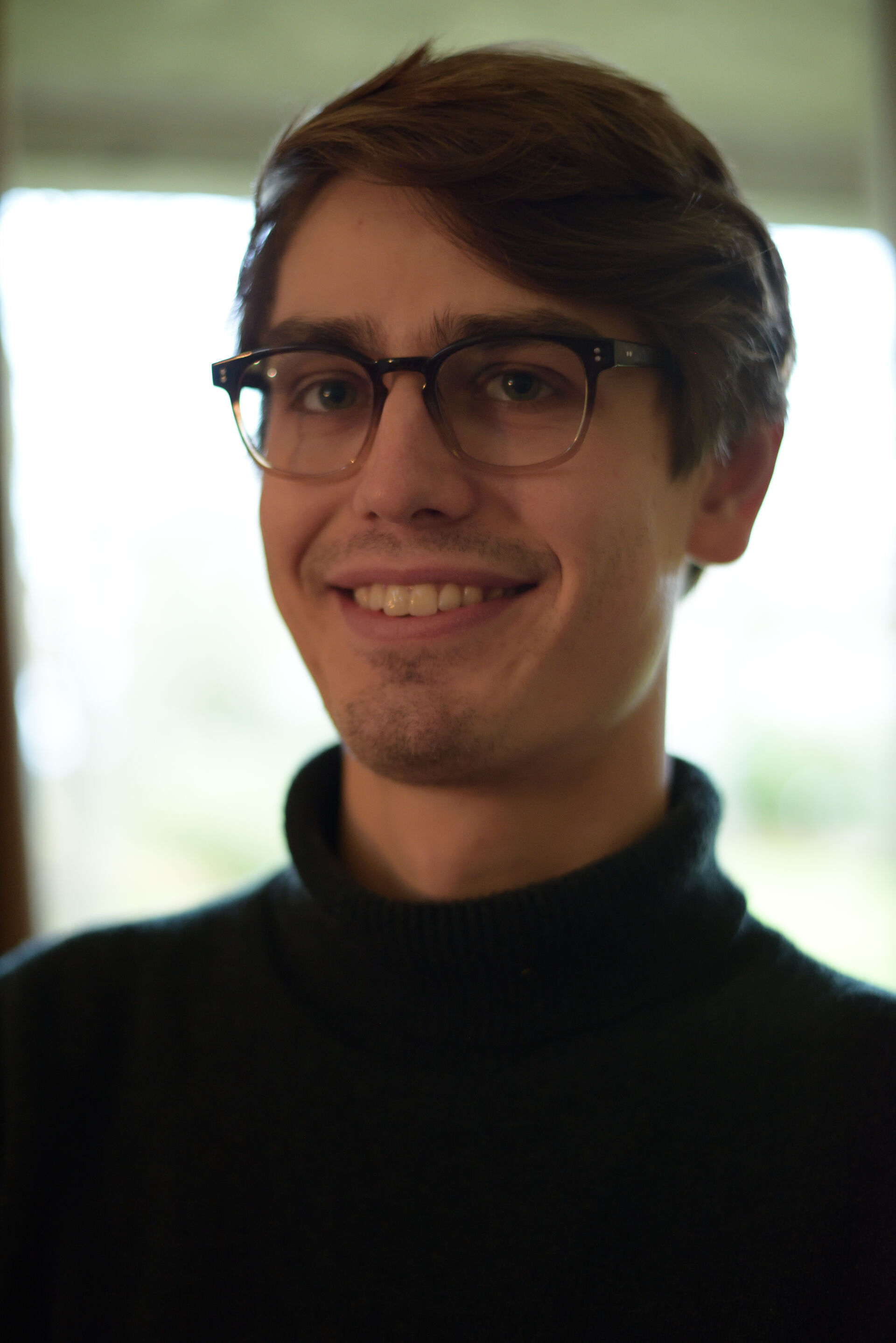
Manon Louviot
Manon Louviot is a musicologist with a special interest in the fourteenth and fifteenth centuries. Her research interests include fourteenth-century motets, music notation, singing, sacred polyphonic practices in the long fifteenth century, in addition to interactions between early music and cultural, historical, and political contexts.
Having obtained a Bachelor of Music in 2013 from the Université de Bourgogne in Dijon, Manon commenced a Research Master programme at the Centre d’Études Supérieures de la Renaissance in Tours, spending one year as an Erasmus student at the Universität Regensburg. Her master’s thesis centred on a late fourteenth-century fragment of polyphonic music preserved in Douai. Between 2016 and 2019, Manon worked at Utrecht University on her doctoral dissertation within the international HERA research project “Sound Memories”. Her dissertation, supervised by Karl Kügle and Ulrike Hascher-Burger, investigated authority and power relationships, the use(s) of monastic space and the role of chant and voice in liturgical practices of the Congregation of Windesheim. Manon comes to Oslo from a post-doctoral scholarship at KU Leuven in David Burn’s and Lenka Hláková’s CELSA project, devoted to musical interactions between the Low Countries and Central Europe in 1400-1650.
Manon’s publications include:
- ‘Controlling Space, Disciplining Voice. The Congregation of Windesheim and Fifteenth Century Monastic Reform in Northern Germany and the Low Countries’, PhD. diss., Utrecht University, 2019. OpenAccess: https://dspace.library.uu.nl/handle/1874/388144
- ‘Uncovering the Douai Fragment: Composing Polyphony and Encoding a Composer in the Late Fourteenth Century’, Early Music History 40, forthcoming: 2021.
- ‘“Elle meuglait comme une génisse.” Fonctions de la vocalité chantée dans le monastère de Diepenveen au XVe siècle.’ In La voix au Moyen Âge: Le Congrès de la SHEMSP. Paris: Éditions de la Sorbonne, 2020, pp. 283–95.
- ‘Flexible uniformity or stability over the years? The liturgy of monastic houses affiliated with the Windesheim Congregation.’ In Sounding the Past: Music as History and Memory, edited by Karl Kügle, Turnhout: Brepols, 2020, pp. 215–2. OpenAccess: www.brepolsonline.net/SoundingThePast

Sigbjørn Olsen Sønnesyn
Originally from Voss, Norway, Sigbjørn received his PhD in medieval history from the University of Bergen in 2007. His doctoral research was concerned with monastic intellectual culture, an area which remains a focus of his work. Sigbjørn has published on monastic theology (particularly moral and liturgical theology), twelfth-century moral thought, medieval writing of history, and most recently on medieval natural science. He is a series editor of Robert Grosseteste’s scientific writings for Oxford University Press, with particular responsibility for editing and translating the Latin texts. The first of a projected six volumes was published in 2019, with the second volume in advanced stages of preparation.
Sigbjørn’s recent publications include:
- Sigbjørn Sønnesyn, ‘Word, Example, and Practice: Learning and the Learner in Twelfth-Century Thought’ Journal of Medieval History 46 (2020), 513–35.
- Giles E. M. Gasper, Sigbjørn Sønnesyn et al., Knowing and Speaking: Robert Grosseteste’s Treatises ‘On the Liberal Arts’ and ‘On the Generation of Sounds’ (Oxford: Oxford University Press, 2019).
- ‘Monastic Life as a Matrix of Meaning: History, Liturgy, and Interior Reform in Early Danish Historical Texts’, in Mia Münster-Swendsen, Thomas K. Heebøll-Holm, and Sigbjørn Sønnesyn (eds.), Historical and Intellectual Culture in the Long Twelfth Century: The Scandinavian Connection (Toronto: PIMS Press, 2016), pp. 131-147.
- “‘Only through time time can be redeemed’: Liturgy, History, and the Timeless Aspirations of the Temporal,” in John Bergsagel, Thomas Riis, and David Hiley (eds.), Of Chronicles and Kings: National Saints and the Emergence of National Saints in the Early Middle Ages (Copenhagen: Museum Tusculanum Press, 2015), pp. 23-50.
- Sigbjørn Olsen Sønnesyn, William of Malmesbury and the Ethics of History (Woodbridge: Boydell & Brewer, 2012).

Nicholas David Yardley Ball
Nicholas David Yardley Ball obtained his Bachelor of Arts in Music from St Anne's College, University of Oxford in 2014 and was awarded the Gibbs Prize for best performance in final examinations. Continuing at St Anne's College, he was awarded funding from the Arts and Humanities Research Council (AHRC) and graduated with a MSt in Musicology in 2015. Nicholas’s thesis concerned notation and performance in Machaut's four-part secular polyphony. Between 2015 and 2020, he undertook a PhD in Musicology at Clare College, University of Cambridge, receiving support from the AHRC and an honorary Vice-Chancellor's award. His doctoral research was concerned with the intersection of music, natural science, and philosophy in the reception of Augustine's De musica in the ninth century, especially in the writing of Johannes Scottus Eriugena.
Nicholas intends to establish the ways in which music writing was used to support the full range of new creative practices represented in the Benedicamus domino settings of the early middle ages and to reveal the aesthetic and historical circumstances that surrounded the performance of the Benedicamus and raised it to such prominence as a ritual moment in the early medieval liturgy.
Nicholas has an ongoing interest in the history of mathematics and number theory in the early middle ages, in which field he is currently preparing a number of articles for publication. Furthermore, he has spoken internationally on the subjects of manuscript studies, palaeography and the history of natural science.
Nicholas's publications include:
- “Review: Andrew Hicks, Composing the world. Harmony in the medieval platonic cosmos” (Oxford University Press, 2017) Music & Letters 98.4 (2017): 669–72.

James R. Tomlinson
James R. Tomlinson is a Doctoral Research Fellow (PhD Candidate) at the Department of Musicology, University of Oslo. James received his Bachelor of Arts in Music from The Queen’s College, University of Oxford in 2020, and his Master of Studies in Medieval Studies from Magdalen College, Oxford in 2021. His MSt thesis investigated the use of architectural metaphor in polyphony and music theory texts from England and France in the thirteenth and fourteenth centuries.
For his PhD thesis as part of the BENEDICAMUS project, James is researching polyphonic practice in fourteenth-century England. He intends to situate musical sources and compositions in their cultural and institutional contexts, and to shed light on the performative and devotional patterns of late medieval English monasteries.
James is an active performer and directs Fount & Origin, a vocal ensemble specialising in late medieval polyphony.